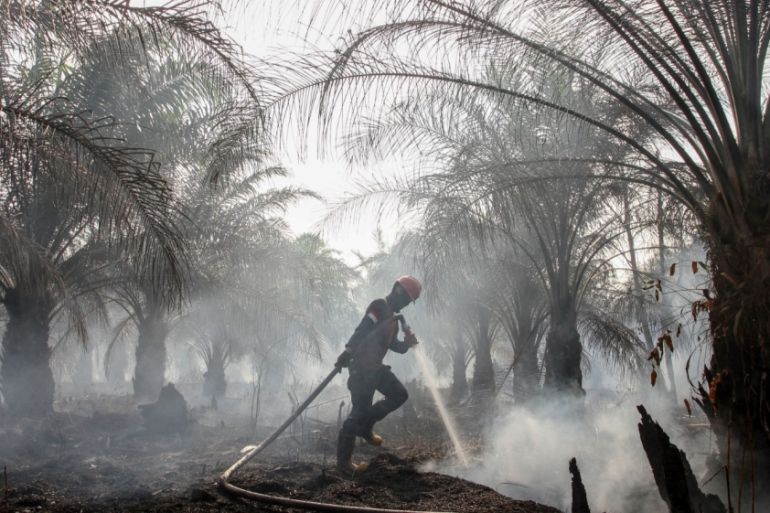Could forest fires burn forever in Indonesia’s peatlands?
Environmental group blames two major pulp producers for some of the worst forest fires this year in new report.

The toxic haze that engulfed Southeast Asia for months throughout the second half of 2019 was not the first time air pollution has scarred the region. And it might not be the last, if Indonesia‘s pulp industry does not undertake major peatland restoration efforts, a new report has warned.
An environmental group calling itself Koalisi Anti Mafia Hutan (the Anti Forest-Mafia Coalition) says two of Indonesia’s largest pulp producers are investing heavily in processes that compound rather than reduce the pressures on fire-prone peatlands.
Keep reading
list of 4 itemsWorld’s coral reefs face global bleaching crisis
Why is Germany maintaining economic ties with China?
Australia’s Great Barrier Reef suffers worst bleaching on record
“They are likely to perpetuate elevated levels of fire and haze risk in Indonesia for many years to come,” said the coalition, which includes United States-based Rainforest Action Network, the Environmental Papers Network and Indonesian environmental protection groups Auriga and Hutan Kita Institute.
Indonesians and their neighbours across Southeast Asia are already suffering the effects of the latest haze.
Despite claims that they are reducing fire risks in plantation concessions they control, wood suppliers to both of Indonesia’s major pulp producers have experienced serious blazes this year, it added.
“Of the eight pulpwood concessions with the worst fires, six are wood suppliers to Asia Pulp & Paper (APP) and one is a wood supplier to Asia Pacific Resources International Limited (APRIL),” the coalition said in its report.
The companies disputed the report’s findings, saying that most of the fire alerts or “hotspots” detected by NASA’s satellites do not correspond to actual fires.
“Based on our internal data, it is estimated that less than 20 percent [of] hotspots detected were related to actual fires,” Elim Sritaba, APP Sinar Mas Chief Sustainability Officer told Al Jazeera in an email response to questions.
APRIL said that 88 percent of the hotspots in Riau on the island of Sumatra occured outside wood fibre concessions, according to data from Global Forest Watch, an open-source forest monitoring application and database, and that its plantations made up only two percent of the total.
APRIL told Al Jazeera that as at the end of August 2019, only eight percent of identified hotspots were confirmed as being fires, and that its operations were not severely affected by the fires.
Both companies said that internal teams investigate every hotspot detected within 24 to 48 hours.
Restoring peatlands
The Anti Forest-Mafia Coalition highlighted, however, that APP and APRIL have together drained peatlands covering 750,000 hectares (1.85 million acres), equivalent to more than 10 times the land area of Singapore.
Not only does this make the land more prone to fires, but neither company has implemented large-scale land restoration measures on which they currently grow acacia wood for pulp production, the coaltion said.
APP’s Sritaba told Al Jazeera, “We remain committed to use only responsible woods from 100 percent sustainable plantations across our supply chain.”
“Where peatlands are concerned, APP Sinar Mas and all our suppliers follow the regulations of the government of Indonesia, which among others move companies operating on peatlands to adopt best practices,” she added.
However, the Anti Forest-Mafia Coalition and other international organisations such as Greenpeace have raised concerns that Indonesia’s government has not been enforcing regulations.
Almost none of the palm oil and pulp companies whose concessions had large tracts of burned land have been punished through serious government sanctions, Greenpeace Indonesia reported in September 2019 based on their analysis of official government data.
Meanwhile, the Anti Forest-Mafia Coalition said that the government facilitated the pulp industry’s continued reliance on peatlands by issuing new regulations in April 2019 that effectively rolled back earlier efforts to restore and protect such fire-prone areas.
Indonesian authorities were considering a plan to impose stricter punishments such as seizing profits from companies or individuals who have benefitted financially from the intentional burning of land, Rasio Ridho Sani, director general of law enforcement at the Environment Ministry, said in late September.
The government has sealed off burned areas within concessions controlled by 52 companies and the authorities are investigating five companies on suspicion of starting fires or being negligent in containing fires within their area, he said.